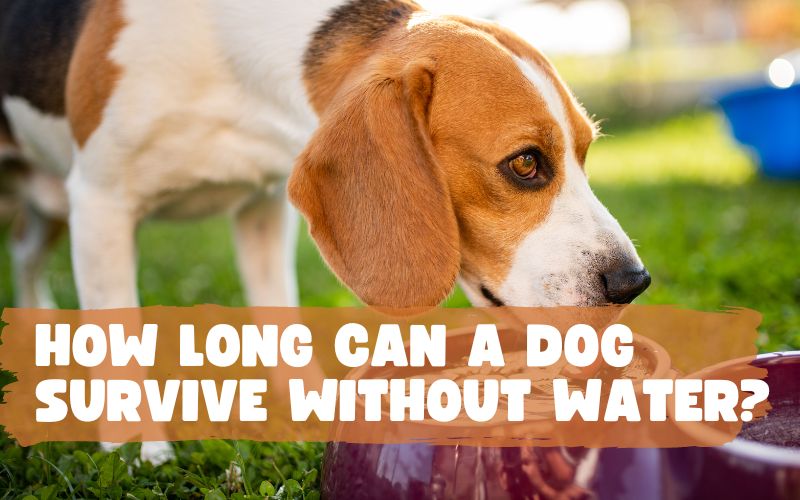It is of utmost importance for every pet owner to take note of their beloved pets’ water consumption needs. It may pose a challenge to determine, but it is essential to keep in mind that dogs must not be deprived of water for more than 2-3 days.
This blog post will provide vital signs of dehydration in dogs, the importance of hydration for their health, and useful tips to ensure they consume enough water.
Let’s dive right into it to keep our furry friends well-hydrated!
How Long Can a Dog Go Without Water?
While your adored pet’s survivability can vary, dogs can generally endure 48 to 72 hours without water. This upper limit signifies a crucial phase where dehydration may wreak havoc on their body systems.
However, a dog owner needs to ensure this threshold is never reached. Ideally, Dogs should only go up to 6-10 hours without drinking water to prevent potential health issues.
The dog’s size directly impacts the duration they can survive without hydration, with smaller breeds often needing more frequent access to water due to their faster metabolic rates than larger dogs.
Additionally, factors such as age and health status can shift these timelines considerably, for example, senior or sick dogs require adequate hydration more regularly for optimal functionality.
Adequate water intake is paramount for maintaining a healthy dog – it assists digestion, regulates body temperature, and helps keep joints lubricated.
A basic guideline suggests an adult dog needs about one ounce of water per pound of body weight each day, but this amount increases during warm weather or when engaging in physical activities. Always ensure clean water is readily available for your dog!
Signs of Dehydration in Dogs
Dehydration in dogs is a serious condition that can lead to severe health problems if not addressed promptly. Every dog owner must know the signs of dehydration to act quickly when their furry friends need help.
One key indicator is the loss of skin elasticity. You can test this by gently lifting the skin at the back of your dog’s neck; your pet may be dehydrated if it doesn’t snap back into place immediately.
Further symptoms include loss of appetite and reduced energy levels. Your usually active companion might need to be more enthusiastic about play or walks. Vomiting, with or without diarrhea, can also signal dehydration.
More alarmingly, some dogs may show signs of illness after just 24 hours without drinking water – underlining how essential regular access to clean and fresh water is for a healthy dog’s well-being.
Importance of Water for Dogs
The significance of water for dogs cannot be overstated. Dehydration can turn fatal quickly, even as short as 24 hours without water showing signs of dehydration in dogs.
Your canine pal requires a regular supply of clean water to sustain all its vital bodily functions effectively, such as digestion, circulation, and body temperature regulation.
The same way humans need water to stay alive and healthy applies to your furry friends. Dogs lose water naturally through sweating and urination; therefore, they must replenish this liquid at intervals.
Water aids in keeping every cell working optimally within their bodies and contributes significantly to their overall health and well-being.
Notably, if you restrict your dog’s access to fresh drinking water or the amount is insufficient in any way over an extended period – particularly during hot weather – it could lead to dangerous health implications.
Hence, ensuring ample fresh water intake for your pet should be a priority for every responsible dog owner.
Tips to Prevent Dehydration in Dogs
To prevent dehydration in dogs, it’s essential to take proactive measures and ensure they have enough water throughout the day.
Here are some tips to keep your furry friend hydrated:
1. Always provide fresh and clean water: Make sure your dog has access to a bowl of fresh and clean water. Change the water daily to maintain its freshness and cleanliness.
2. Encourage regular drinking: Some dogs may need to drink more alone, especially if they’re busy or distracted. Encourage them to drink by adding a little flavoring to their water or using a pet fountain that provides a continuous flow of moving water.
3. Monitor water intake: Keep an eye on how much water your dog drinks each day. On average, dogs need about one ounce of water per pound of body weight daily. Adjust their intake accordingly based on activity level, weather, and whether they’re nursing puppies.
4. Hydrate during exercise: Be mindful of their hydration needs when taking your dog for walks or engaging in physical activities. Bring a collapsible travel bowl and frequently offer them small amounts of water to prevent dehydration.
5. Incorporate moisture into meals: If you feed your dog dry kibble, consider adding some moisture-rich foods like canned food or broth into their diet occasionally. This will help increase their overall fluid intake and keep them hydrated.
Keep in mind that prevention is critical when it comes to dehydration in dogs. Ensuring your dog’s good health and hydration requires following these tips and regularly monitoring their water intake.
Conclusion
Dog owners must understand the importance of water and how long their furry friends can go without it.
While dogs can typically survive 2-3 days without water, it is not recommended to let them go for more than 2 to 5 days.
Adequate hydration is essential for a dog’s overall health and well-being, so ensure they have access to clean water at all times. Always note that a hydrated pup is a happy pup!
